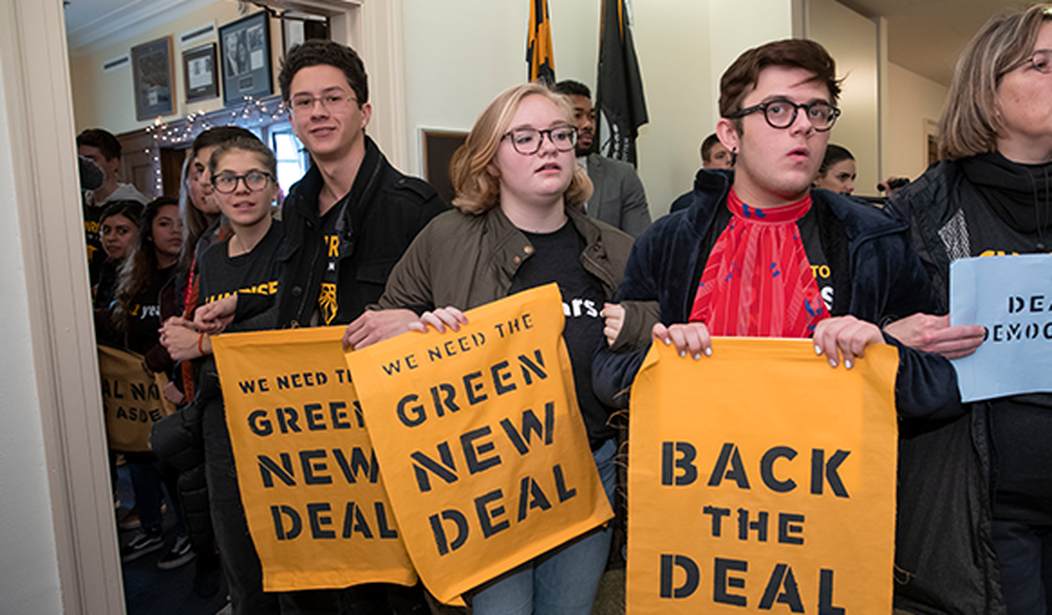There’s some good news to report: Government-backed net-zero, decarbonization energy policies are losing ground here in the U.S. and abroad.
Bloomberg writes Americans appear to long for Trump administration-era energy policies and European right-wing parties skeptical of Green New Deal policies are gaining traction ahead of their June parliamentary elections.
"Part of the reason the political winds are shifting is that climate regulations, as they ramp up in stringency, are starting to impinge more on people’s daily lives — at a time when many feel squeezed by inflation and the cost of living,” the report observed.
With respect to our country, Americans care deeply about the environment and want clean air and clean water. Who doesn’t? What turns people off from environmentalism, naturally, is putting nature above people and guilting us for traveling, driving cars, eating red meat, and simply breathing.
Polling has consistently shown people are extremely turned off by climate and environmental policies requiring increased utility bill payments to combat climate change.
Recommended
In 2019, an AP-NORC poll found most respondents are unwilling to pay more than $10 a month to fight a so-called climate crisis. A recent poll from CRC Research surprisingly found a majority of those aged 18-to-34 - an oft-discussed Biden constituency - don’t want to pay more to “fight” climate change either.
Another AP-NORC poll published last fall found people weigh taste, costs, and health concerns well above environmental impact with respect to their eating habits. Red meat bans, it reported, are unpopular with Democrats, Republicans, and independents:
Overall, there is little support for some policies suggested to reduce meat consumption in order to help the environment. Both Democrats and Republicans oppose increasing taxes on the sale of meat. While most Republicans disagree with requiring public schools to serve vegetarian meals once a week or banning public advertising for meat on government property, Democrats tend to be more conflicted on these issues.
We’re told glaciers are melting at a rapid pace because we’re not decarbonizing fast enough to meet Paris Climate Accords goals. Yet, if glacial ice is in short supply and melting at alarming rates, why are people exporting Arctic glacial ice to Dubai? They interviewed a glaciology professor who, ironically, is perfectly fine with this:
Others, however, have no problem with the concept of commercializing Greenland’s ice.
“There will be a lot of people moaning,” said Jason Box, a glaciology professor at the Geological Survey of Denmark and Greenland, “but in my view, the love of the ice, the aesthetic of the shape and story of the ice, far outweigh environmental concern.”
Its fractal geometry will make it look like a tiny iceberg in a glass, he told CNN.
“It’s like fine art. It gets people talking. And of course they will feel a little sorrow for being part of the global warming problem.”
Last summer, Pew Research Center did the unthinkable: it didn’t dismiss climate skepticism. The report analyzed how a sizable chunk of America isn’t buying what climate alarmists are selling. It observed many Americans find the climate crisis narrative is overblown for two reasons: the climate changes naturally - even when buoyed by population growth and increased reliance on fossil fuel production and consumption - and extreme weather events are not as frequently occurring as sensationalized by the media.
The latter is especially true, with there being a 96% reduction in climate-related deaths from natural disasters since the 1920s.
Speaking of the Paris Climate Accord goals, returning to a pre-industrial climate would be miserable. Ryan Maue, a research meteorologist and former chief scientist at the National Oceanic and Atmospheric Administration (NOAA) during the Trump administration, noted, “Climate scientists and global policy makers point to the optimal period in Earth's climate history of 1850-1900, called the pre-industrial climate -- from when the 1.5°C is calculated. Except, it was hell and deadly for humanity. We don't want to go back to that.” He’s right.
Despite the facts, climate catastrophizing permeates today. Yet, it’s not a new phenomenon.
As philosopher Alex Epstein aptly notes in his Energy Talking Points Substack, climate catastrophizing traces back decades.
Paul Ehrlich, a climate alarmist who supports population control, wrote in his 1986 book The Machinery of Nature: “As University of California physicist John Holdren has said, it is possible that carbon-dioxide climate-induced famines could kill as many as a billion people before the year 2020.”
Did his prediction come true? Of course not. The opposite, however, is true, observes Epstein, “The strong correlation between increasing fossil fuel use and increasing life expectancy is not coincidental--it is causal. Billions of people have broughtthemselves out of poverty by using uniquely cost-effective fossil fuels to power factories, farms, vehicles, and appliances.”
We’re also told that our mere existence and continued dependence on fossil fuels is imperiling polar bears. Yet, polar bears have made a miraculous comeback and even have gotten so plentiful to warrant hunting as a sustainable management tool.
More recently, Greta Thunberg incorrectly predicted— then deleted– a tweet suggesting continued fossil fuel usage would wipe out humanity by June 2023.
As I often write here at Townhall, Americans respond well to environmentalism that is conservationist in nature – a wise use of natural resources that welcomes positive human input while reasonably balancing development with stewardship.
Policy prescriptions that advance true conservation over climate catastrophizing will be welcomed and rewarded.

























